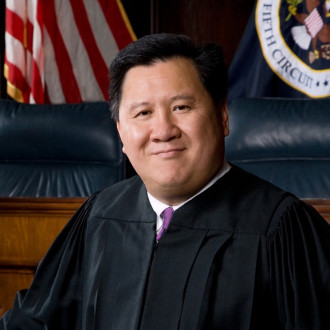5th Circuit judge's dissent says to prevent mass shootings 'we should stop punishing police officers'

“We should stop punishing police officers,” Judge James Ho wrote. Photo from the 5th U.S. Circuit Court of Appeals.
An opinion by a federal appeals judge appointed by President Donald Trump is getting some attention because of an opening line linking mass shootings to police punishment.
Judge James Ho dissented Monday when the New Orleans-based 5th U.S. Circuit Court of Appeals declined to grant an en banc rehearing in a case involving a police shooting of a black man. Law & Crime and CNN noted the opinion.
“If we want to stop mass shootings,” Ho wrote, “we should stop punishing police officers who put their lives on the line to prevent them.”
Ho’s opinion was joined by Judges Jerry Smith, Edith Brown Clement and Kurt Engelhardt.
A 5th Circuit panel had refused to toss an excessive force suit against the county that employed the officers, but it found none of the officers could be liable. Though the officers were protected, Ho said the panel majority’s analysis of qualified immunity was too tough for officers who must make split-second decisions.
The shooting occurred in April 2013 when deputies with the Kaufman County, Texas, Sheriff’s office responded to several 911 reports of a man who was firing a gun and destroying mailboxes, according to the Feb. 18 panel decision. Callers reported that the suspect was a black male wearing a brown shirt and jeans. He yelled, “Everyone’s going to get theirs,” and, “I’m just trying to get back what’s mine,” according to the callers.
After officers arrived on the scene, they encountered a black male in a brown shirt who fired a gun in their direction. The suspect walked out of officers’ view. Police spotted him momentarily a second time, but he ducked out of sight.
A few minutes later officers spotted a man riding a bicycle toward them. He was dressed in a blue jacket. All of the officers said he was armed and had raised his pistol to a firing position.
One officer yelled that the bicyclist had a gun, and another yelled, “Put that down!” The officers fired their weapons. The bicyclist fled, but officers found him minutes later in his father’s backyard suffering from gunshot wounds.
The bicyclist’s father tossed a toy gun at police and said, “There is your gun.”
Officers said the bicyclist, Gabriel Winzer, resisted when they tried to handcuff him, so they used a Taser on him. Winzer went limp. He was pronounced dead at the scene.
The parents of the bicyclist sued. They say Winzer was inside his father’s house when the suspect shot at police, and he was not the shooter. According to the family, Winzer was pedaling toward the officers to show them his toy pistol, he was not armed, and he did not raise his arms toward the police.
The 5th Circuit panel ruled that claims against two of the officers were barred by the statute of limitations because they were added as defendants after the date for filing suit. The panel said a third officer was entitled to qualified immunity based on a second prong of the immunity analysis that looks to clearly established law. The panel said Wizner’s right to be free from the officer’s excessive force in such circumstances was not clearly established at the time, so the officer could not be liable.
The panel did allow the family’s suit against Kaufman County to proceed.
Clement partly dissented from the panel decision. She argued that the panel was right to find qualified immunity to the third officer, but it should have ruled for him on the first prong of the qualified immunity test. That prong considers whether the officer’s use of force is objectively reasonable.
Ho sided with Clement’s panel opinion. He pointed out that a forensic report detected gunshot residue on Winzer’s body and officers found multiple weapons in his father’s home. “Nothing in the record suggests who else (if not Winzer) might have been the shooter who terrorized the innocent citizens of Kaufman County that day,” he wrote in a footnote.
Ho defended the Kaufman County deputies and police in general. He wrote:
“It is unknown how many lives were saved by these deputies on April 27, 2013. What is known, however, is that Kaufman County will now stand trial for their potentially life-saving actions—and that its taxpayers, including those who will forever be traumatized by Winzer’s acts of terror, will pick up the tab for any judgment.
“I have deep concerns about the message this decision, and others like it, sends to the men and women who swear an oath to protect our lives and communities. For make no mistake, that message is this: See something, do nothing.
“What’s more, we have no business—no factual basis in the record, and no legal basis under the Fourth Amendment—second-guessing split-second decisions by police officers from the safety of our chambers.”



